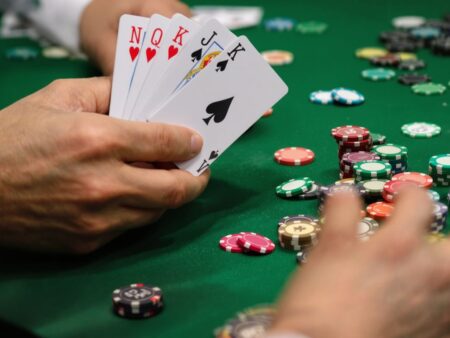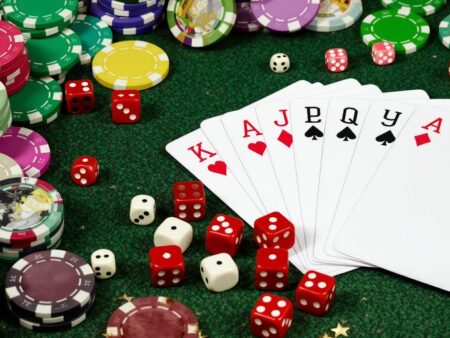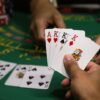Right then, so you’re looking to get better at online poker cash games in 2025? It’s a bit of a minefield out there, with so many different approaches people try. Some folks just play loads of hands, others are super tight, and then there are the ones who seem to be bluffing every other hand. It can be tough to figure out what actually works. But don’t stress, we’ve pulled together some solid strategies that should help you improve your game and hopefully win a bit more cash. These are the best strategies for online poker cash games that we think will make a difference.
Key Takeaways
- When you’ve got a strong hand, don’t be shy about betting for value. Get as much money into the pot as you can.
- Playing fewer hands before the flop is generally a good idea. Stick to the stronger starting hands.
- If someone re-raises you on the turn or river, it’s usually a sign they have a pretty decent hand. Pay attention to that.
- Against players who call too much (often called ‘fish’), just keep betting when you think you have the best hand. Forget about bluffing them.
- When you hit a scare card on the turn or river, especially against players who are tight and likely to fold, it can be a good spot to keep betting.
2. Play Tighter Preflop
Alright, let’s talk about preflop play. This is where a lot of beginners really struggle, and honestly, it’s not that complicated once you get the hang of it. The main idea is to be selective about the hands you decide to play. You want to enter pots with hands that have a good chance of winning, either on their own or with some help from the board.
Think about it this way: if you’re playing too many hands, especially weak ones, you’re basically giving your chips away. You’ll find yourself in tough spots postflop a lot, and that’s never fun. So, what kind of hands should you be playing? It really depends on your position at the table. The later you are, the more hands you can play because you get to see what everyone else does first.
Here’s a rough guide for a standard 6-max table:
- Early Position (UTG, UTG+1): Stick to premium hands like pocket Aces (AA) through Tens (TT), Ace-King (AK), and Ace-Queen suited (AQs). Maybe add some suited connectors if you’re feeling brave, but keep it tight.
- Middle Position (MP1, MP2): You can open this up a bit. Add pocket Nines (99) and Eights (88), King-Queen (KQ), Jack-Ten suited (TJs), and maybe Ace-Jack suited (AJs).
- Late Position (Cutoff, Button): This is where you can really start to play some hands. Add pocket Sevens (77) down, Ace-King offsuit (AKo), Queen-Jack offsuit (QJo), and a wider range of suited connectors and gappers.
- Blinds (Small Blind, Big Blind): These are tricky. You generally want to defend your big blind against raises with a wider range than you’d open with, but be careful not to play too many hands out of position.
Remember, these are just starting points. You’ll need to adjust based on your opponents. If the players before you are tight, you can loosen up a bit. If they’re super aggressive, you’ll want to tighten up even more. The goal is to put yourself in the best possible situation before the flop even hits the felt.
3. Respect Turn and River Re-raises

Alright, let’s talk about what happens when you’re trucking along, feeling pretty good about your hand, and then BAM! Someone throws a re-raise at you on the turn or river. This is where a lot of players, especially those just starting out, tend to get a bit flustered. They might think, ‘Oh no, they must have the nuts!’ and just fold.
Now, it’s true, especially at the lower stakes, that a big re-raise on these later streets often means your opponent has a monster hand. They’re not usually messing around. Think about it: most players at these levels are pretty passive. They like to call, see what happens, and aren’t big on aggressive moves unless they’re really confident.
So, when someone who’s been calling their way through the hand suddenly decides to put in a significant raise, it’s a strong signal. It’s not always the absolute nuts, but it’s usually something very strong. You’ve got to respect that aggression. Folding your hand, even if you think you might be ahead, is often the correct play to avoid losing a big chunk of your stack.
Here’s a general idea of how to approach these situations:
- Recognise the strength: A re-raise on the turn or river usually means a very strong hand, like two pair, a set, a straight, or a flush. Don’t dismiss it.
- Consider your opponent: Is this player generally tight and only raises with the best hands? Or are they a bit wild and prone to bluffing? Your read on them is key.
- Pot odds matter: Even if you suspect they have a strong hand, you still need to consider the price you’re getting to call. If the pot is huge and your stack is deep, a call might be justifiable with certain hands, but usually, it’s a fold.
- Don’t get married to your hand: Just because you had pocket aces preflop doesn’t mean you’re invincible. Poker is about making the best decision based on the information you have, not on what you started with.
4. Don’t Bluff The Fish

Alright, let’s talk about the ‘fish’ – those players who just seem to call everything. If you’re playing at the lower stakes, you’ll see them a lot. They’re the ones who will call your bets with pretty much any two cards, hoping to get lucky. Trying to bluff these players is usually a waste of time and chips. They just don’t fold.
Instead of trying fancy bluffs, your best bet is to just value bet your strong hands. This means betting when you’ve got a good hand, like top pair, two pair, or even a strong draw. Let them call you down with their weaker holdings. They’re essentially paying you to take their money.
Here’s a simple breakdown:
- When you have a strong hand: Bet for value. Make them pay to see the next card or showdown.
- When you have a medium-strength hand: Bet for value, but be prepared to slow down if they show a lot of aggression.
- When you have a weak hand or nothing: Check and give up. Don’t throw good money after bad trying to bluff someone who won’t fold.
Don’t get cute with the fish; just extract value. They’re not paying attention to your betting patterns, so trying to outsmart them with bluffs will likely backfire. Keep it simple, bet your good hands, and let them make the mistakes.
5. Barrel Scare Cards Versus Tight Players
Alright, so you’ve identified a player who folds a lot when they don’t have a monster hand. These are often the ‘weak-tight’ types you’ll see at lower stakes. They’re not exactly aggressive, just sort of waiting for the perfect hand. If you’ve got a HUD, look for stats like a low VPIP (Voluntarily Put $ In Pot) and PFR (Pre-Flop Raise), maybe something like 18/15/2 in 6-max or 12/9/2 in full ring. A low WTSD (Went To Showdown) percentage, say in the low 20s, is also a big clue they’re scared to go to showdown without a really strong hand.
This is where you can really make them sweat. When a card comes on the turn or river that looks like it could really hurt their likely hand range, that’s your cue. Think of an Ace or a King appearing when the board is low and they’ve shown weakness. This ‘scare card’ is your chance to bet again, even if you’ve got nothing yourself. They’re likely to be holding something like pocket tens, nines, or eights, and that Ace on the turn? It’s probably not good for them. Because they’re scared to commit chips without a strong hand, they’ll often just fold to your second barrel. It’s a bit of an advanced move, so make sure you’re only doing this against these specific types of players, not the ones who call everything.
6. Always Enter The Pot With A Raise

Alright, let’s talk about getting into the pot. In online cash games, especially in 2025, you really want to be the one dictating the action from the get-go. This means when it’s your turn to act and no one’s raised yet, you should be making a raise yourself. Don’t just call the big blind – that’s called limping, and it’s generally a pretty weak move.
Why is this so important? Well, for starters, it gives you more ways to win the pot. You might win it right there if everyone folds to your raise. Or, you can continue the pressure after the flop and potentially win it then. It also helps you build bigger pots when you have a strong hand, which is exactly what you want to do. Plus, by raising, you’re showing strength and making it harder for your opponents to figure out what you’ve got. They have to consider a range of hands, not just one specific hand, which makes them more likely to make mistakes.
Think about it: if you limp, you’re basically inviting everyone else to see the flop cheaply. The more players who see the flop, the higher the chance your hand gets outdrawn. Raising, on the other hand, narrows the field and gives you a better chance to play heads-up or against fewer opponents, especially when you’re in position.
Here’s a simple guide to starting raises:
- When you have a big stack (over 50 big blinds): A standard raise is usually around 3 times the big blind.
- When you have a smaller stack (less than 50 big blinds): You might want to adjust slightly, maybe to 2.5 times the big blind.
- Against very tight players: Sometimes, if a super tight player raises from early position, you might consider just calling with a premium hand like pocket tens or Aces, especially if you’re in position. This is to keep them in the pot and control the size of the pot. But in most other situations, especially when you’re the first one in, raising is the way to go.
7. Be Prepared For Bad Beats
Alright, let’s talk about the inevitable – the bad beats. Online poker moves at a cracking pace, way faster than live games. This means you’re going to cop more coolers, more suck-outs, more times when the deck just seems to hate you. It’s just the maths of the game, mate. You might see three times, maybe even ten times, the number of bad beats you’re used to if you’re coming from a live background.
The key is not to let these moments send you on a tilt. When you get dealt pocket Aces and someone hits a runner-runner flush, it stings. No doubt about it. But if you let that frustration dictate your play, you’ll end up spewing your whole bankroll. You’ve got to zoom out. Think about your results over months, even years, not just a single session or a bad day.
Here’s how to keep your head when the cards aren’t falling your way:
- Accept it’s part of the game: Bad beats happen to everyone, even the best players in the world. It’s not personal.
- Focus on good decisions, not outcomes: Did you play the hand correctly based on the information you had? If yes, then you can’t beat yourself up about the result.
- Take a break if needed: If you’re feeling emotional after a bad beat, step away from the tables for a bit. Clear your head before jumping back in.
- Review your play: Sometimes, a bad beat can highlight a leak in your own game. Was there a better way you could have played it, even if the outcome was unlucky?
Remember, the players who manage their emotions and stick to solid strategy through the ups and downs are the ones who last and ultimately win in the long run.
8. Play More Exploitative Poker
Righto, let’s talk about playing exploitative poker. This isn’t about sticking to some rigid, textbook strategy all the time. Nah, it’s about looking at your opponents and figuring out how they play, then adjusting your own game to take advantage of their weaknesses. Think of it like this: if you’re playing against someone who folds way too easily to continuation bets on the flop, you’re going to be c-betting a lot more, even with hands that aren’t super strong. Conversely, if you’ve got a player who just calls everything, you’re going to slow down on the bluffs and focus on value betting your good hands until the cows come home.
It’s all about tailoring your approach. Here are a few ways to think about it:
- Identify their leaks: Are they too passive? Too aggressive? Do they fold to pressure? Do they call too much? Pinpointing these habits is your first step.
- Adjust your betting: If someone’s a calling station, you bet big with your strong hands and check back weaker ones. If they’re super tight, you might bluff more or bet thinner for value.
- Exploit positional tendencies: Some players play differently depending on where they are at the table. Use that information.
The goal is to make them uncomfortable and force them into making mistakes. It’s not about being tricky for the sake of it, but about maximising your winnings by playing the player, not just the cards.
9. Observe Opponent Tendencies
Alright, so you’ve made it to the $5/$10 tables, or maybe you’re just aiming to step up your game. One of the biggest things that separates the winners from the rest at these stakes is really paying attention to who you’re playing against. It’s not just about your own cards anymore; it’s about understanding your opponents’ habits.
Think about it: if you’re always betting big with your strong hands and folding everything else, the regulars will clock that pretty fast. They’ll start folding to you unless they’ve got the nuts themselves, or worse, they’ll try to bully you out of pots because they know you won’t fight back. That’s why you gotta mix things up. Sometimes you need to play a bit looser, maybe throw in a bluff here and there, just to keep them guessing. It’s about making them uncomfortable.
Here’s a quick rundown of what to look out for:
- Betting Patterns: Does someone always bet big when they have it and check when they don’t? Or maybe they only bet when they hit the flop hard.
- Preflop Tendencies: Are they playing a ton of hands, or are they super tight? Do they limp a lot, or do they always raise?
- Postflop Aggression: How often do they continuation bet? Do they fold easily to a re-raise, or do they fight back?
Paying attention to these details can seriously change how you play a hand. For example, if you know a player folds a lot to turn bets, a scare card on the turn might be the perfect time to bluff. Conversely, if someone calls everything, you’ll want to slow down with your bluffs and just value bet your strong hands. It’s a constant adjustment, but it’s how you start to really crush the game.
10. Master The Meta Game

Alright, so you’ve made it to the $5/$10 tables, which is where things start getting a bit more serious. It’s not just about playing your own cards anymore; you’ve gotta be aware of what everyone else is doing, and how they think you’re playing. This is what we call the ‘meta game’.
Think of it like this:
- Understanding Opponent Tendencies: Are they tight? Loose? Aggressive? Passive? Do they bluff too much? Do they only bet when they have it? Spotting these patterns is key. You can even jot down notes on your poker software if you’re playing online.
- Adapting Your Strategy: If you notice a player folds too much to continuation bets on the flop, you’ll want to c-bet more often. If someone calls down with weak hands, you’ll value bet them relentlessly.
- Table Image: How do the other players see you? If you’ve been playing super tight and only showing down monsters, you might get away with a big bluff. Conversely, if you’ve been in a lot of pots and looking a bit wild, they’ll be less likely to believe you when you make a big bet.
The meta game is all about exploiting the specific players at your table. It’s not enough to just play solid poker; you need to adjust your approach based on who you’re up against. This is where you find those extra edges that really add up over time.
Wrapping It Up
So, there you have it. We’ve covered a fair bit of ground on how to tackle those online cash games in 2025. Remember, it’s not just about the cards you get dealt, but how you play them. Keep things simple against the weaker players, value bet like your life depends on it, and don’t get too fancy with the bluffs. As you move up, paying attention to your opponents becomes a bigger deal. It’s a grind, for sure, and there will be ups and downs, but stick to the plan, manage your money well, and most importantly, try to have a bit of fun with it. Good luck at the tables!
Frequently Asked Questions
What does it mean to ‘value bet your strong hands’?
Basically, you want to bet when you’ve got a really strong hand, like a full house or three of a kind. Don’t be shy about putting more money in the pot when you’re likely to have the best hand. It’s all about getting paid off by your opponents.
Why should I play ‘tighter preflop’?
It means being a bit more selective about the hands you play before the flop. Instead of playing almost any two cards, focus on the stronger ones. This gives you a better chance to win pots and makes things simpler.
What should I do if someone re-raises me on the turn or river?
If someone suddenly raises you big on the turn or river, it usually means they have a very strong hand. It’s smart to be cautious and not call these big re-raises unless you’re absolutely sure you have the best hand or a very good reason to think they’re bluffing.
Why shouldn’t I bluff ‘the fish’?
Players who call almost every bet, often called ‘fish’, aren’t usually trying to bluff you. So, trying to bluff them back is usually a waste of time and money. It’s better to just bet for value when you have a good hand.
What are ‘scare cards’ and when should I ‘barrel’ them?
When the board changes and shows cards that might scare a tight player (like a third card of the same suit or a straight possibility), you can bet again. They might fold weaker hands because they’re worried about you having a strong hand.
Why should I always ‘enter the pot with a raise’?
When you decide to enter a pot, it’s best to start with a raise instead of just calling. This shows strength, helps you control the pot size, and can make other players fold weaker hands before the flop even comes.
What does it mean to ‘be prepared for bad beats’?
Poker has a lot of ups and downs. Sometimes you’ll lose with the best hand, which is called a ‘bad beat’. You can’t let these moments get to you. Just focus on playing your best game, and the results will come over time.
What is ‘exploitative poker’?
This means adjusting your play based on how your opponents are acting. If someone is playing too predictably, you can use that information to your advantage. It’s about finding their weaknesses and exploiting them.







